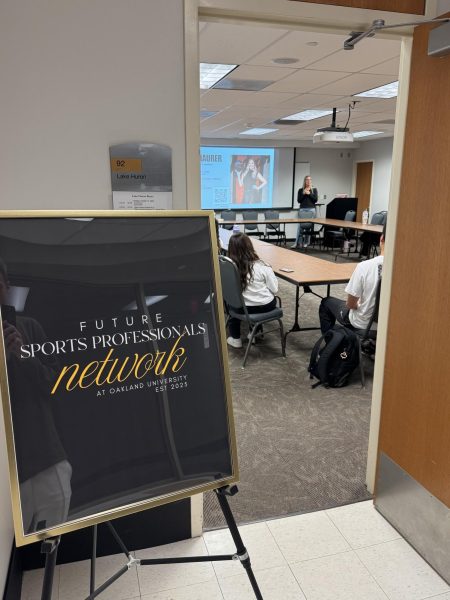Digital celebrity daze
Celebrities, they play with their kids, buy Starbucks Coffee, fall in and out of love—and we watch.
Oakland University’s Dr. Erin Meyers book “Dishing Dirt in the Digital Age: Celebrity Gossip Blogs, and Participatory Media Culture,” was published April 30, 2013.
In her book she examines how celebrity culture has changed over the years, and the role blogs and advanced media technologies have caused.
“We’ve become much more into surveillance culture, we want to see everything. Paparazzi and digital cameras have made it so much easier for celebrities to be a constant focus of everyday life,” Meyers said.
Blog
Meyers began her research in 2005. She chose six blogs ‘Perez Hiltion,’ ‘Pink is the ‘New Blog,’ ‘Popsugar,’ ‘Young Black and Fabulous,’ ‘What Would Tyler Durden Do’ and ‘Jezebel.’
Through blogs the creator posts stories they’ve seen from outside sources and allows user commentary. Each blog has a different perspective that appeals to their audience.
“A place like ‘Popsugar’ loves celebrity babies and celebrity fashion. It just depends on what you’re looking for on a blog. Some blogs lovingly mock and others, like Perez, mocks to be mean. Some people like that mean girl thing and they go there to see celebrities get bashed,” Meyers said.
Meyers spent several hours scanning every site looking at updates and searching for comments of users. She found in many cases the comments of the users reflected the style of the blog.
Blogs set up their own technological control. Meyers said certain blogs, such as ‘Jezebel’ require comments to be approved a moderator before even appearing on the site. Others, such as Perez Hilton don’t monitor user comments at all.
Throughout her studies, Meyers was able to contact all blog administers, minus Perez Hilton, and found that most of them weren’t even in the media industry, they had just enjoyed expressing their opinions online, and developed an audience.
Meyers also posted an online survey on several blogs to find out what attracted users to blogging.
“People love the instant access and the community aspect. They could talk to people about it instantly. They also liked that it wasn’t always scandals, it also showed celebrities doing everyday things, like getting their Starbucks,” Meyers said.
Through blogging readers can see the latest gossip, and begin talking about their opinions immediately.
Safe Gossip
Meyers believes that celebrity gossip is a way for people to unconsciously work out social norms.
Meyers presented the case of Angelina Jolie and Jenifer Aniston when they battled for the love of Brad Pitt.
“The side you chose said something about you as an individual and what you believed was normal for women in society. It’s a safe way to gossip. You can say whatever you want about these celebrities and re-establish your beliefs,” Meyers said.
Surveillance Mode
However, the game is changing in today’s media world. The mystery of Old Hollywood has been placed with reality shows such as, “Keeping Up with the Kardashians’,” “Jersey Shore” or “Basketball Wives.”
These reality shows are focused on people going through everyday life and attract millions of viewers.
According to E! Online, the Keeping Up with the Kardashians’ Facebook page adds 989 fans a day, 7, 279 fans a week and 34, 743 fans a month.
“Over the past decade is the extent to which the public has access to and now takes for granted—the personal lives of celebrities. It is now commonplace for people to acquire fame simply because they of their willingness to make their private life public,” said Rebekah Farrugia, associate professor of communication, with a specialization in media studies.
However, other celebrities who have been in the spotlight for years have also chose to make reality shows. One example is Britney Spears, who started her own reality show in 2005 called, “Chaotic.”
“I think some celebrities see a reality show as an opportunity to take away the control over what people see in their lives,” Meyers said.
For more information on “Dishing Dirt in the Digital Age: Celebrity Gossip Blogs, and Participatory Media Culture,” contact Dr. Meyers at [email protected].




